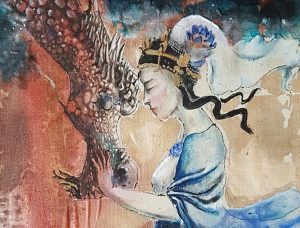
The socially engaged Japanese Nichiren Buddhist organization the Soka Gakkai International (SGI) marked the 50th anniversary of its founding with a commemorative gathering at the SGI Guam Ikeda Peace and Culture Center on the Micronesian island of Guam in January. Assembling for the occasion, were SGI-USA representatives, an SGI delegation from Japan, and 300 local members, memorializing the day when 158 representatives from 51 countries and territories gathered in Guam on 26 January 1975 for the First World Peace Conference, marking SGI’s founding.
“The SGI was inaugurated as a global association to support the faith and Buddhist practice of the growing numbers of individuals practicing Nichiren Buddhism with the Soka Gakkai around the world,” SGI said in a statement shared with BDG. “At the conference, then Soka Gakkai President Daisaku Ikeda was appointed president of the SGI.
“Launching the SGI on Guam—the site of fierce fighting between American and Japanese forces during World War II and countless deaths of innocent civilians–was Ikeda’s vision. He chose Guam as the symbolic starting point for this network committed to promoting understanding between cultures and actualizing peace.”
from these auspicious origins, the organization has evolved and expanded around the world, to include some three million overseas members, in addition to more than eight million households in Japan. SGI added that the largest numbers of members were in Brazil, India, Italy, South Korea, and the US, with growing memberships in parts of Africa.
“Commemorative meetings took place around the world,” SGI noted. “The focus was on marking a new start toward the next 50 years, and on the upcoming 100th anniversary of the founding of the Soka Gakkai in 2030. . . .
“At each gathering, participants recalled the speech given by Ikeda on 26 January 1975, in which he stressed that Buddhism is grounded in the philosophy of respect for the dignity of life and encouraged the members to live altruistically, dedicating their lives to sowing the seeds of peace throughout the world and contributing to the happiness of others and the good of society.”

Ahead of the anniversary celebrations, the SGI Global Perspectives Committee—which includes SGI leaders engaged in peace activities throughout the world—released a public statement on 15 January titled “Preventing the Use of Nuclear Weapons as a Step Toward a Peaceful World.”
Noting that “the risk that nuclear weapons might actually be used is today higher than at any time since the end of the Cold War,” the statement seeks to push forward two urgent proposals for the international community: the adoption of pledges of No First Use of nuclear weapons; and the establishment of an international center dedicated to the prevention of nuclear war.
“Policies of No First Use would necessitate rethinking national security frameworks and it would be crucial to develop systemic measures and assurances to alleviate nations’ fears and concerns,” said SGI Director General for Peace and Global Issues Hirotsugu Terasaki. “In this regard, SGI proposes establishing a nuclear war prevention center staffed by military and political experts who could quickly identify critical situations and take measures toward de-escalation.”
Founded in 1930, the Soka Gakkai (the Value Creation Society) is a Japanese Buddhist movement based on the teachings of the 13th century Buddhist priest Nichiren (1222–82). Nichiren taught devotion to the Lotus Sutra, believed to contain the teachings of the historical Buddha, Shakyamuni, toward the end of his life, as the exclusive means to attain enlightenment. Soka Gakkai centers its teachings on the Lotus Sutra, with recitation of the mantra “Nam-myoho-renge-kyo” (“Glory to the Dharma of the Lotus Sutra”) as its main devotional practice.
The Soka Gakkai International, founded by Daisaku Ikeda (1928–2023) in 1975, is an NGO with consultative status to UN ECOSOC. As a global community-based Buddhist organization that promotes peace, culture, and education based on respect for the dignity of life, the Soka Gakkai is involved in peace activism, education, and politics, with members in 192 countries and territories around the world.
Some of the Soka Gakkai’s high-profile members have included actor Orlando Bloom, jazz musician Herbie Hancock, and singer Tina Turner.
Faced with the horrifying facts of nuclear proliferation, we must call forth the power of hope from within the depths of each individual’s life. We need a revolution in the consciousness of countless individuals―a revolution that gives rise to the heartfelt confidence that, ‘There is something I can do.’ Then, finally, we will see a coming together of the world’s people, and hear their common voice, their cry for an end to this terrible madness of destruction. — Daisaku Ikeda
See more
Soka Gakkai International
Preventing the Use of Nuclear Weapons as a Step toward a Peaceful World (Soka Gakkai)
Related news reports from BDG
Soka Gakkai International to Open New Community Center in Sunnyvale, California
Soka Gakkai USA Sues Army Corps Over Everglades Conservation Project
Engaged Buddhism: The Soka Gakkai International to Sponsor Nobel Peace Prize Forum and Youth Dialogue with Atomic Bomb Survivors in Oslo
Engaged Buddhism: The Soka Gakkai International Calls for Youth Engagement in Climate Policy at COP28
The Soka Gakkai Holds Memorial Ceremony in Tokyo for Daisaku Ikeda
Socially Engaged Buddhist and Soka Gakkai Leader Daisaku Ikeda Dies Aged 95
Related features from BDG
From Nichiren to Ikeda: The Soka Gakkai’s Socially Engaged Buddhism













